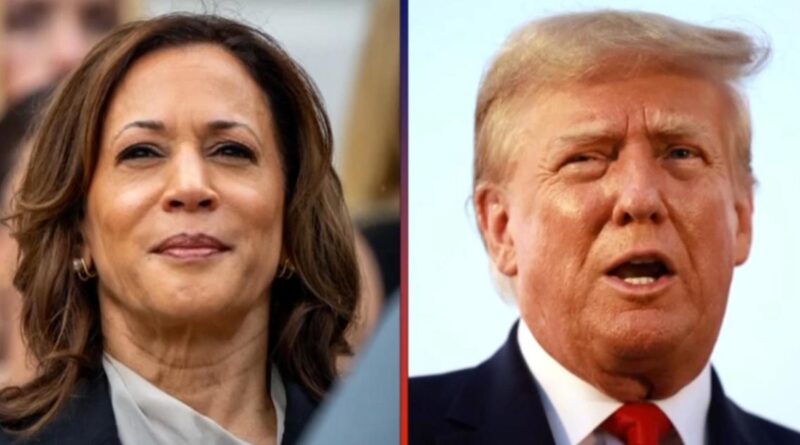The economy is a top issue for voters. Here’s what to watch for in the Harris-Trump debate.
The economy, a key issue for voters as the November 5 presidential election draws nearer, will have a starring role in the debate tonight between the two candidates, Democratic nominee Kamala Harris and her Republican rival, former President Donald Trump.
About 8 in 10 adults tell CBS News that the economy is a major factor in their choice at the polls, outpacing issues such as abortion and climate change.
Each candidate will seek to convince voters that their proposals will lead to better economic conditions, ranging from bigger paychecks to lower inflation. And CBS News polling shows that Trump may have an edge with inflation-weary consumers, with about 4 in 10 voters saying prices are likely to go down if he wins — twice as many as those who believe the same would be the case with a Harris victory.
“[I]nflation and the high cost of living are deeply impacting lower- and middle-income Americans,” said Liza Landsman, the CEO of Stash, a financial services firm that polled consumers ahead of the debate, in a statement. “What the study did shed sharper light on is how vastly different individuals’ perceive their economic condition depending on their political view.”
For instance, about 7 in 10 Trump supporters told Stash they are deeply concerned about inflation, compared with 2 in 10 Harris voters, the study found.
Economists largely rate the current economy as good, albeit with some weak spots, such as a slowing labor market. But about 42% of Americans incorrectly believe the U.S. is currently in a recession, down from about 48% last year, a new MassMutual survey found.
“Sometimes it is difficult to separate out various doom-and-gloom factors when it is hitting your wallet directly,” Paul LaPiana, a certified financial planner and head of brand, product and affiliated distribution with MassMutual, told CBS MoneyWatch.
Even so, a number of Wall Street economists are predicting that Harris’ policies are likely to result in stronger economic growth for the U.S., while warning that Trump’s combination of tariffs and tax cuts could both spur inflation while causing the deficit to mushroom by trillions.
Here’s what to know about three key economic issues that could influence voters.
Inflation and grocery costs
Inflation has sapped household budgets since 2021, when prices started rising due to the impact of the pandemic, which disrupted global supply chains and prompted the federal government to pump trillions into the economy. (Both Presidents Trump and Biden signed large spending bills into law during the pandemic, authorizing stimulus payments and extra unemployment aid, among other supports).
To temper inflation, the Federal Reserve responded by hiking interest rates to their highest point in 23 years. That’s paying off, with government data on Wednesday expected to show that inflation cooled to 2.6% on an annual basis in August, its lowest since March 2021, according to financial data firm FactSet.
But lower inflation doesn’t mean that prices have come down; instead, it simply means that the rate of price hikes have moderated from their pandemic peak.
The candidates are likely to discuss their plans to address inflation, which remains a key issue for voters given that grocery costs remain 21% higher than they were prior to the pandemic. That means a cart of groceries in 2020 that cost $150 would now set you back by $182, or $32 more at the register.
Harris has vowed to tackle grocery costs by enacting the first federal law against price gouging by food suppliers and retailers. But economists say they’re skeptical such a law could make much of an impact.
Trump, meanwhile, has pledged to end the “inflation nightmare.” But his policies, which include adding tariffs to all imported goods, would likely fuel inflation and reverse some of the progress of the last two years, some economists say.
What the candidates are pledging on taxes
Both Harris and Trump have already made some tax pledges, with Harris vowing to increase the corporate tax rate and Trump proposing a steep cut, taking it down to 15% from its current 21%.
Trump also wants to extend his Tax Cuts and Jobs Act — his 2017 law that reduced tax rates for most individuals but provided the biggest benefits to the nation’s richest families. Many of those cuts are due to expire at the end of 2025. Trump’s vice presidential running mate, JD Vance, has also floated the idea of a bigger Child Tax Credit.
Harris, meanwhile, wants to enact more generous tax benefits, such as a $6,000 Child Tax Credit for parents of newborns and a bigger Earned Income Tax Credit. One analysis from the nonpartisan Penn Wharton Budget Model found that her proposals would help more low- and middle-income families than Trump’s.
“If Democrats sweep, personal and corporate taxes and benefit spending will likely rise,” Goldman Sachs analysts said in September 3 research report. “If Republicans sweep, they will likely stay mostly unchanged.”
Housing and the American Dream
Housing remains out of reach for millions of Americans who are now priced out of home-buying due to high mortgage rates and housing prices.
Harris has proposed providing $25,000 in down payment assistance for Americans who have paid their rent on time for two years, with more support for first-generation homeowners. She’s also proposing tax incentives for builders of starter homes, with the goal of widening the housing supply and lowering home prices.
Trump, meanwhile, has proposed making federal land available to help with housing supply, but his campaign hasn’t offered any details. He’s also vowed to deport between 15 million to 20 million undocumented workers, which he’s blamed for increasing housing demand and pushing up prices.
But the surge in home prices preceded the recent jump in undocumented workers, the New York Times reported. And deporting so many workers, many of whom work in construction, could jeopardize the workforce that builds homes.
— With reporting by CBS News’ Jo Ling Kent.





